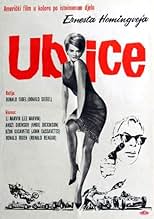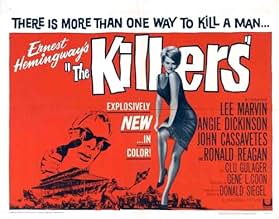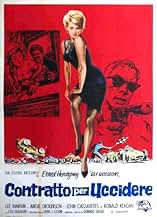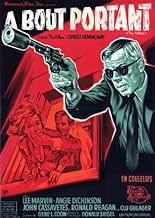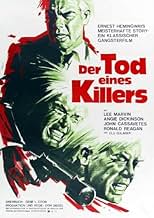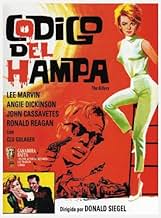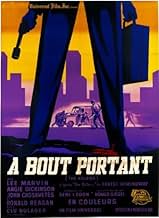AVALIAÇÃO DA IMDb
7,0/10
10 mil
SUA AVALIAÇÃO
Surpreendidos por a vítima não ter tentado fugir deles, dois assassinos profissionais tentam descobrir quem os contratou e por quê.Surpreendidos por a vítima não ter tentado fugir deles, dois assassinos profissionais tentam descobrir quem os contratou e por quê.Surpreendidos por a vítima não ter tentado fugir deles, dois assassinos profissionais tentam descobrir quem os contratou e por quê.
- Direção
- Roteiristas
- Artistas
- Ganhou 1 prêmio BAFTA
- 1 vitória e 1 indicação no total
Irvin Mosley Jr.
- Mail Truck Guard
- (as Irvin Mosley)
- Direção
- Roteiristas
- Elenco e equipe completos
- Produção, bilheteria e muito mais no IMDbPro
Avaliações em destaque
Director Don Siegel's "The Killers" is very loosely based on the Hemingway short story with few similarities. Two killers (Lee Marvin and Clu Gulager)complete an easy hit-for-hire but wonder why their victim, although warned in advance, didn't run away from them. After piecing together some information, they realize that the $25,000 they got for the hit is a drop in the bucket compared to a missing million dollar stash of stolen loot. After questioning a few "witnesses" they discover that the man they killed had been double-crossed and had lost his will to live. Throw in Angie Dickinson as a two-timing temptress and Ronald Reagan (of all people) as a nasty double-dealing henchman and you've got one violent movie without any good guys in sight. Marvin and Gulager are excellent as the hit men and John Cassavettes is also great as their hapless and resigned victim. Reagan, who supposedly regretted his turn here as a villian, is surprising effective. It was the only time in his career he played a "bad guy". Angie Dickinson, of course, is no mere window-dressing. She gives everyone a run for their money as the best-looking devious dame on the planet. "The Killers", which was originally made for TV, but released in theatres instead due to its violent subject matter, is a one-of-a-kind early 60's film noir. It may have little to do with Hemingway's story, but I'm sure "Papa" would have enjoyed it anyway.
Lee Marvin and Clu Gulager, two contract killers, walk into a Midwest school for the blind and cold-bloodedly murder John Cassavettes. "We walk in, we put him down, we walk out," muses Marvin distractedly on the train back to Chicago. Cassavettes had the chance to run but didn't, and Marvin wants to know why.
Initially, Don Siegel's colour remake of the Ernest Hemingway story was intended as the first made-for-TV movie. Vetoed by the network for its amoral viewpoint and violence, it was released in cinemas and quickly became a cult 1960s B-movie.
Anonymous and menacing in executive suits, sunglasses and briefcase, Marvin and scene-stealing Gulager memorably personify organised crime under Siegel's expert direction. They're pure all-American evil.
True, the main plot - pieced together in flashback as the two hitmen track down the mail robbery gang led by Ronald Reagan (his last film) - is pretty routine stuff. But even that serves to heighten the threat represented by Marvin and Gulager, as they unravel the real reason for Cassavettes' deathwish.
"No one ever knows what we're talking about," mocks Gulager when femme fatale Angie Dickinson tries to act dumb. The scene in the hotelroom where the killers force her to tell is handled with a ferocious cool that is Siegel's trademark.
The Killers was still in production when Kennedy was assassinated - perhaps one reason, given its theme, why TV network ABC pulled it from their 1964 schedule. The scene where Gulager is shot down on a sunlit sidewalk even echoed the killing of Kennedy assassin Lee Harvey Oswald (Gulager's character is called Lee).
OK, it's not a masterpiece. Even the great Don Siegel can't quite disguise a B-movie budget, a repetitious screenplay, brightly artificial colour, and exteriors that are only too obviously the Universal backlot. But it is tense and exciting, thanks to Siegel's authoritative grasp of the genre.
"I shot it in the style which I think is my style at its best," Siegel concluded later. "Very taut and lean with great economy. If I had to do it over again, I don't think I would change much."
Initially, Don Siegel's colour remake of the Ernest Hemingway story was intended as the first made-for-TV movie. Vetoed by the network for its amoral viewpoint and violence, it was released in cinemas and quickly became a cult 1960s B-movie.
Anonymous and menacing in executive suits, sunglasses and briefcase, Marvin and scene-stealing Gulager memorably personify organised crime under Siegel's expert direction. They're pure all-American evil.
True, the main plot - pieced together in flashback as the two hitmen track down the mail robbery gang led by Ronald Reagan (his last film) - is pretty routine stuff. But even that serves to heighten the threat represented by Marvin and Gulager, as they unravel the real reason for Cassavettes' deathwish.
"No one ever knows what we're talking about," mocks Gulager when femme fatale Angie Dickinson tries to act dumb. The scene in the hotelroom where the killers force her to tell is handled with a ferocious cool that is Siegel's trademark.
The Killers was still in production when Kennedy was assassinated - perhaps one reason, given its theme, why TV network ABC pulled it from their 1964 schedule. The scene where Gulager is shot down on a sunlit sidewalk even echoed the killing of Kennedy assassin Lee Harvey Oswald (Gulager's character is called Lee).
OK, it's not a masterpiece. Even the great Don Siegel can't quite disguise a B-movie budget, a repetitious screenplay, brightly artificial colour, and exteriors that are only too obviously the Universal backlot. But it is tense and exciting, thanks to Siegel's authoritative grasp of the genre.
"I shot it in the style which I think is my style at its best," Siegel concluded later. "Very taut and lean with great economy. If I had to do it over again, I don't think I would change much."
One of Hollywood's greater contract directors, Donald Siegel, brought Hemmingway's short story to TV, but NBC turned it down because, for 1964, it was too damn brutal. Although it pales in comparison to the 1946 original, this cheap (thanks to the gawd-awful production values of Universal in the sixties) remake holds it own.
When button-men Lee Marvin and Clu Gulager show up at a school for the blind to empty their silenced revolvers into former race-car driver John Cassavetes, they don't expect him to just stand there and take it. Marvin, exuding clean-smelling and lean menace and Gulager, a carrot-juice swilling sociopath travel cross-country in their search for Cassavetes' story. They find that the race driver, washed up after a near-fatal crash gains employment with mobster Ronald Reagan (I can just see Ronnie giving Gorbachev the same look at the 1986 summit that he gives Cassavetes when the driver challenges the mobster for control of Reagan's girl, Angie Dickinson). After lots of double-crosses and a fair amount of "why did he or she do that?," Marvin comes calling at Reagan's door.
Lee Marvin was excellent when portraying a killing machine and he holds the movie together. He and Gulager are there to punctuate the sometimes good and sometimes not-so-good flashbacks and they are suave and eerily debonair grim reapers. If anything, they're more interesting than the flashbacks; all good action flicks need good bad guys and Reagan looks too bored with the whole thing. Is it possible that, after seeing him so successful and upbeat for eight years in the White House, a grim and petty Reagan seems anachronistic? Yet, it really is Marvin who makes this movie rise above the cheap production values, the cheesy matte photography, and the canned John(ny) Williams score.
Marvin was about to begin a string of successes that would last into the early seventies. That voice is so distinctive! When he talked, he sounded, as another reviewer once said, "like a dinosaur growling." He is so evil and you can't stop liking him. Although Marvin and Robert DeNiro are completely different actors, they both have the same effect on me when they inhabit the screen--I stop doing everything else and just watch them. Pure charisma. When asked by David Letterman why he was so popular, Lee Marvin simply grinned and, with his index finger extended, growled, "Ratatatat!" Don Siegel would go on to make other tough movies; his style was clean, tough, and with just enough style to leave the audience with a satisfied taste in it's mouth. Under his direction, Clint Eastwood would establish himself as a superstar. One can only imagine how far Marvin would have gotten under the command of the button-man director!
When button-men Lee Marvin and Clu Gulager show up at a school for the blind to empty their silenced revolvers into former race-car driver John Cassavetes, they don't expect him to just stand there and take it. Marvin, exuding clean-smelling and lean menace and Gulager, a carrot-juice swilling sociopath travel cross-country in their search for Cassavetes' story. They find that the race driver, washed up after a near-fatal crash gains employment with mobster Ronald Reagan (I can just see Ronnie giving Gorbachev the same look at the 1986 summit that he gives Cassavetes when the driver challenges the mobster for control of Reagan's girl, Angie Dickinson). After lots of double-crosses and a fair amount of "why did he or she do that?," Marvin comes calling at Reagan's door.
Lee Marvin was excellent when portraying a killing machine and he holds the movie together. He and Gulager are there to punctuate the sometimes good and sometimes not-so-good flashbacks and they are suave and eerily debonair grim reapers. If anything, they're more interesting than the flashbacks; all good action flicks need good bad guys and Reagan looks too bored with the whole thing. Is it possible that, after seeing him so successful and upbeat for eight years in the White House, a grim and petty Reagan seems anachronistic? Yet, it really is Marvin who makes this movie rise above the cheap production values, the cheesy matte photography, and the canned John(ny) Williams score.
Marvin was about to begin a string of successes that would last into the early seventies. That voice is so distinctive! When he talked, he sounded, as another reviewer once said, "like a dinosaur growling." He is so evil and you can't stop liking him. Although Marvin and Robert DeNiro are completely different actors, they both have the same effect on me when they inhabit the screen--I stop doing everything else and just watch them. Pure charisma. When asked by David Letterman why he was so popular, Lee Marvin simply grinned and, with his index finger extended, growled, "Ratatatat!" Don Siegel would go on to make other tough movies; his style was clean, tough, and with just enough style to leave the audience with a satisfied taste in it's mouth. Under his direction, Clint Eastwood would establish himself as a superstar. One can only imagine how far Marvin would have gotten under the command of the button-man director!
I recently saw this at the 2008 Palm Springs Film Noir Festival. Not really Film Noir as it was made after the genre had passed and is in color and features no detectives or private eyes and not even a film as it was originally intended as the very first made-for-television movie. Produced by Universal's Revue Studios it was deemed too violent for television. It of course isn't too violent by today's standards and NBC censors did call for revisions of the movie and since there are only a few questionable scenes It could have been easily done but they left it as was and it didn't make it's May of 1964 television premier. Instead it went to theaters and drive ins in July of 1964. Long-time film and television director Don Siegel directs. His most noted work would still come late in his career with Clint Eastwood in "Coogan's Bluff", "Two Mules for Sister Sara", "The Beguiled", "Dirty Harry" and "Escape From Acatraz" and John Wayne in "The Shootist" and Charles Bronson in "Telefon." This film is as different from the 1946 film as that film is as different from the short story by Earnest Hemingway that both film borrow from. The 1946 film is noted for being Burt Lancaster's first film role and the 1964 film is noted for being Ronald Reagan's last film role. Seasoned hit-man Charlie Storm (Lee Marvin) and young enforcer sidekick Lee (Clu Gulager) have been hired for larger than usual fee to knock off a retired professional race car driver who now teaches shop class in a school for the blind. A series of flashbacks tell the story of Johnny North (John Cassavetes) and his mechanic Earl Sylvester (Claude Akins) and the femme fatale Sheila Farr (Angie Dickenson) who comes into their lives. Sheila is the kept woman of mobster Jack Browning (Ronald Reagan) whose gang includes Mickey Farmer (Norma Fell) and George Flemming (Robert Phillips). Also in the cast are a couple of familiar and wonderful character television actors in small support roles with Kathleen O'Malley and Burt Mustin. Music score by John Williams when he was a contract composer before he made it big the film also features a Henry Mancini song "Too Little Time" with an on screen performance by jazz singer Nancy Wilson. Screenplay adaptation by Gene L. Cook and director Siegel this deserves a look especially from it's great cast and historical perspective. It keeps flowing pretty smoothly and never bogs down. Cassavetes seems uncomfortable in the role and their really isn't much on screen chemistry between he and Dickenson but Dickenson is delicious as the femme fatale and Marvin and Gulager, especially Gulager's smooth wit, are great as the hit team. Angie Dickenson was on hand at the screening for an audience Q&A following the film and it was great to see her. I liked this and would give this an 7.5 out of 10.
Don Siegel's 'The Killers' is a diamond in the rough! Initially filmed for television, its technical limitations are easily overlooked as they are more than compensated for by the drive of the no-nonsense narrative, and the high standards of the acting. Caught somewhere between Kubrick's 'The Killing' and Boorman's 'Point Blank', it may not be as flamboyantly impressive as either, but it is just as memorable in its own low key way.
Quentin Tarantino has admitted that the structure of 'The Killing' has influenced him, but after watching 'The Killers', one must question whether this movie is also high on his list. Especially as the cooler-than-thou hit-men played by Lee Marvin and Clu Gulager almost anticipate Travolta and Jackson's similarly quirky ones in 'Pulp Fiction' thirty years later. Just like Vincent and Jules, Charlie and Lee are eccentric and likable when "off duty" and brutal sociopaths when on. Lee Marvin is one of Hollywood's legendary screen tough guys, and his performance here is as good as any he ever did, but the real stand out for me is Clu Gulager's health nut contract killer. He just about steals every scene he is in. Up to this point he was mainly known as a Western TV star. Why this role didn't launch him into a Bruce Dern/Harry Dean Stanton/Dick Miller style career baffles me. Instead he was mainly consigned to the "made for TV" wasteland, and never got the breaks his talent deserved.
Marvin and Gulager's star turns are backed up by strong supporting performances from John Cassavetes, as their enigmatic "job", Angie Dickinson, a double-crossing femme fatale, and Ronald Reagan in a surprising turn as a nasty gangster. Also keep an eye out for a dialogue-free cameo by a very young looking Seymour Cassel!
'The Killers' looks better and better as the years go by. Not without flaws, sure, and calling it a masterpiece would be overkill, but it's a movie that was ahead of it's time in many ways, and it can't help but impress discerning fans of 50s/60s b-grade crime movies, film noir, or Sam Fuller.
Quentin Tarantino has admitted that the structure of 'The Killing' has influenced him, but after watching 'The Killers', one must question whether this movie is also high on his list. Especially as the cooler-than-thou hit-men played by Lee Marvin and Clu Gulager almost anticipate Travolta and Jackson's similarly quirky ones in 'Pulp Fiction' thirty years later. Just like Vincent and Jules, Charlie and Lee are eccentric and likable when "off duty" and brutal sociopaths when on. Lee Marvin is one of Hollywood's legendary screen tough guys, and his performance here is as good as any he ever did, but the real stand out for me is Clu Gulager's health nut contract killer. He just about steals every scene he is in. Up to this point he was mainly known as a Western TV star. Why this role didn't launch him into a Bruce Dern/Harry Dean Stanton/Dick Miller style career baffles me. Instead he was mainly consigned to the "made for TV" wasteland, and never got the breaks his talent deserved.
Marvin and Gulager's star turns are backed up by strong supporting performances from John Cassavetes, as their enigmatic "job", Angie Dickinson, a double-crossing femme fatale, and Ronald Reagan in a surprising turn as a nasty gangster. Also keep an eye out for a dialogue-free cameo by a very young looking Seymour Cassel!
'The Killers' looks better and better as the years go by. Not without flaws, sure, and calling it a masterpiece would be overkill, but it's a movie that was ahead of it's time in many ways, and it can't help but impress discerning fans of 50s/60s b-grade crime movies, film noir, or Sam Fuller.
Você sabia?
- CuriosidadesAccording to Don Siegel, it was the policy at "Universal" at the time to shoot the last scene of the film first. On that first day of filming, according to Siegel and Clu Gulager, Lee Marvin arrived late and had been drinking, but because he had no dialogue, the scenes were used as shot.
- Erros de gravaçãoAt the start of the race, Johnny presses the accelerator to the floorboard with his right foot. However, his left foot is nowhere near the clutch. In a manual transmission, the clutch would need to be released while simultaneously accelerating.
- Citações
Charlie Strom: Lady, I don't have the time.
- Cenas durante ou pós-créditosThe style of the film's credits reflects its original made-for-TV origins: in 1960s TV movies, Stars, Co-stars, and Featured Players were listed only in the opening credits, while supporting players were listed only in the closing credits.
- ConexõesFeatured in Biografias: Angie Dickinson: Tinseltown's Classiest Broad (1999)
- Trilhas sonorasToo Little Time
Music by Henry Mancini
Lyrics by Don Raye
Sung by Nancy Wilson
[Johnny and Sheila dance to the song performed at the nightclub]
Principais escolhas
Faça login para avaliar e ver a lista de recomendações personalizadas
- How long is The Killers?Fornecido pela Alexa
- What kind of race car did John Cassavetes character, Johnny North, drive in this movie?
Detalhes
Bilheteria
- Orçamento
- US$ 750.000 (estimativa)
- Faturamento bruto mundial
- US$ 9.261
- Tempo de duração1 hora 33 minutos
- Cor
- Proporção
- 1.85 : 1
Contribua para esta página
Sugerir uma alteração ou adicionar conteúdo ausente



